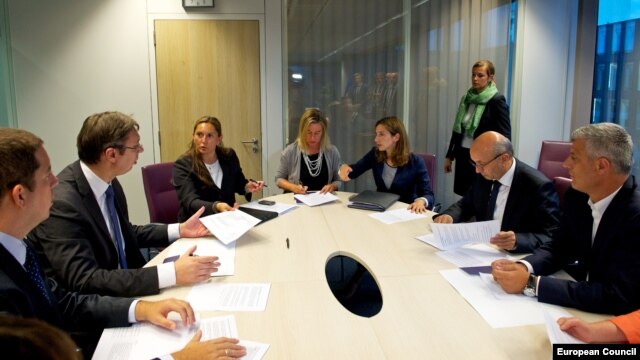Serbia, Kosovo overcome past disputes in 'landmark' accord
| Publisher | Radio Free Europe/Radio Liberty |
| Publication Date | 26 August 2015 |
| Cite as | Radio Free Europe/Radio Liberty, Serbia, Kosovo overcome past disputes in 'landmark' accord, 26 August 2015, available at: https://www.refworld.org/docid/55ee971f2b.html [accessed 22 May 2023] |
| Comments | All reference to Kosovo should be understood in full compliance with United Nations Security Council Resolution 1244. |
| Disclaimer | This is not a UNHCR publication. UNHCR is not responsible for, nor does it necessarily endorse, its content. Any views expressed are solely those of the author or publisher and do not necessarily reflect those of UNHCR, the United Nations or its Member States. |
Last updated (GMT/UTC): 26.08.2015 07:29
By RFE/RL
 The EU's Federica Mogherini (center) meets with Kosovar Prime Minister Isa Mustafa (second from right) and Serbian Prime Minister Aleksandar Vucic (second from left) in Brussels on August 25.
The EU's Federica Mogherini (center) meets with Kosovar Prime Minister Isa Mustafa (second from right) and Serbian Prime Minister Aleksandar Vucic (second from left) in Brussels on August 25.
Serbia and Kosovo have taken steps toward overcoming decades of animosity, signing an agreement that moves toward normalizing relations and joining the European Union.
After EU-mediated talks in Brussels, prime ministers Aleksandar Vucic of Serbia and Isa Mustafa of Kosovo reached a deal in four critical areas, including energy, telecommunications, and the judiciary.
"Today's outcome represents landmark achievements in the normalization process," EU foreign policy chief Federica Mogherini said. "Solutions such as those found today bring concrete benefits to the people and at the same time enable the two sides to advance on their European path."
The agreement comes two days before a summit in Vienna between EU leaders, including German Chancellor Angela Merkel, and Balkan heads of state. The summit is expected to focus on the migrant crisis, as well as prospects for joining the EU.
Under the agreement, Serbs in northern Kosovo will enjoy greater rights and be able to manage some issues such as the local economy and education, as well as having access to funding from Belgrade.
Kosovo will have its own telephone country code, in a move seen as a major concession by Serbia on the sovereignty of Kosovo, which declared independence in 2008.
Belgrade had previously refused to join the United States and most of the EU in recognizing Kosovo as an independent state.
The agreement also sets up a judicial structure in northern Kosovo acceptable to both the minority ethnic Serbs and majority Kosovars, who are ethnic Albanians, the EU said. It also covers use of the disputed Mitrovica Bridge.
The accord carries out a 2013 agreement brokered by the EU, which was aimed at regulating and normalizing relations between Serbia and Kosovo. Serbia's hopes of opening its first chapter in EU accession talks hinge on complying with the 2013 accord.
The two neighbors have come a long way since fighting a war in 1998-99. The war ended after Serbian armed forces withdrew from Kosovo following an 11-week NATO bombing campaign.
The U.S. State Department praised both governments for their progress "moving their countries closer to normalization of relations, and along their respective EU paths."
With reporting by Reuters and AFP
Link to original story on RFE/RL website
